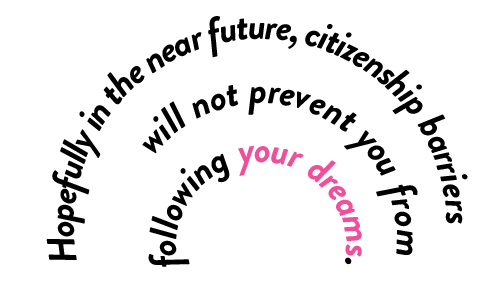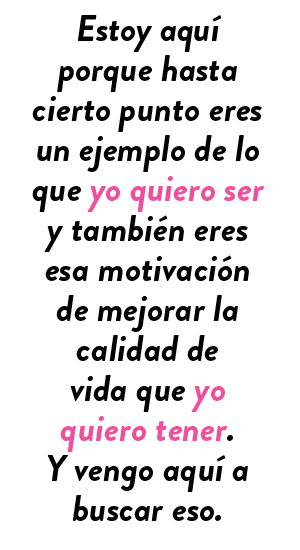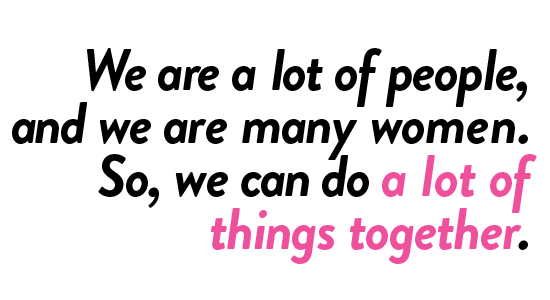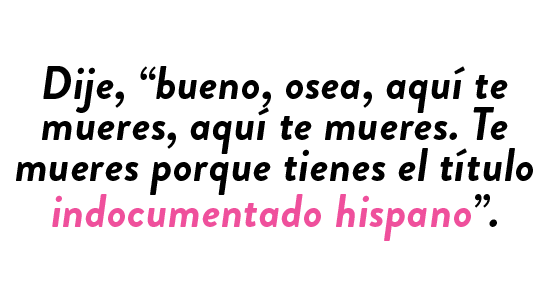Undocumented Women's Health Experiences

Healthcare is a basic human right, yet, as the undocumented discover in Oklahoma and beyond, they must struggle for that right and for recognition of their full humanity. The approximately 85,000 undocumented immigrants in the state [1] —representing community leaders, coworkers, family members, neighbors—navigate a number of barriers to access care, including cultural and language barriers, discrimination from medical providers, fear of deportation, and staggering medical costs. The stories undocumented women share reveal the individual, emotional impacts of these barriers, and suggest the transformative possibilities of policy reform.
Oklahoma, like other states across the country, lacks a comprehensive healthcare program for undocumented immigrants. The only state health program for this population is the Soon-to-be-Sooners program, which provides pregnancy-related medical services for women regardless of their legal status. [2] Medicaid, the Children’s Health Insurance Program (CHIP), and other benefits programs restrict eligibility to citizens or certain categories of legal immigrants. [3]
Undocumented immigrants are also not eligible for subsidized coverage under the Affordable Care Act (ACA). [4] To obtain health coverage, they must purchase private health insurance at full cost or receive insurance through an employer. Private insurance is often prohibitively costly, as many undocumented immigrants work for low wages in labor-intensive jobs, and employer-provided insurance is not widely available, [5] as only employers with more than 50 employees are mandated to provide health coverage under the ACA. Consequently, this population largely remains uninsured, deepening the already devastating impact of other health disparities. [6]
Navigating life without health insurance is an exhausting, often invisible burden, affecting not only one’s physical health but also emotional well-being and capacity to thrive. Undocumented immigrants without insurance turn to income-based community clinics for primary or preventive care, [7] and emergency rooms for life-threatening situations. [8] Though hospitals that receive federal funding (most do) must provide emergency care for all, uninsured patients are still left with staggering out-of-pocket costs, creating another barrier to care—even in life-or-death situations.
Cultural factors rooted in the realities of being undocumented in America also affect immigrants’ access to healthcare. These realities are exacerbated within more marginalized identities within the undocumented community such as women and LGBTQ2S+ individuals. As the narratives in this section reveal, many undocumented families live with the constant fear of deportation, leading them to avoid hospitals or clinics. In addition, they often face language barriers that deter them from seeking care or compromise the quality of care itself. One woman describes, in a narrative below, “There were no nurses who spoke Spanish . . . if you wanted to speak in Spanish they had to call a translation center and then sometimes they could not hear you well or the call would cut out.” Both the fear of deportation and communication difficulties due to language difference contribute to a culture of distrust and discomfort with the healthcare system among immigrant communities.
In the following stories, undocumented women excavate their personal histories, exploring the intersections of race, gender, and immigration status in Oklahoma on a deeply intimate level. They dance around the boxes they are expected to inhabit, challenging societal conceptions of undocumented immigrants, affirming their inherent value and humanity. They describe their struggles with healthcare, explaining what it feels like to not be able to afford glasses or communicate with the doctor or afford life-saving medical care. Yet as their narratives illustrate, despite these challenges, undocumented women remain dreamers at heart—dreaming of better futures for themselves, their families, and their communities; dreaming of a better Oklahoma for all.
Undocumented Women's Health Experiences

Healthcare is a basic human right, yet, as the undocumented discover in Oklahoma and beyond, they must struggle for that right and for recognition of their full humanity. The approximately 85,000 undocumented immigrants in the state [1] —representing community leaders, coworkers, family members, neighbors—navigate a number of barriers to access care, including cultural and language barriers, discrimination from medical providers, fear of deportation, and staggering medical costs. The stories undocumented women share reveal the individual, emotional impacts of these barriers, and suggest the transformative possibilities of policy reform.
Oklahoma, like other states across the country, lacks a comprehensive healthcare program for undocumented immigrants. The only state health program for this population is the Soon-to-be-Sooners program, which provides pregnancy-related medical services for women regardless of their legal status. [2] Medicaid, the Children’s Health Insurance Program (CHIP), and other benefits programs restrict eligibility to citizens or certain categories of legal immigrants. [3]
Undocumented immigrants are also not eligible for subsidized coverage under the Affordable Care Act (ACA). [4] To obtain health coverage, they must purchase private health insurance at full cost or receive insurance through an employer. Private insurance is often prohibitively costly, as many undocumented immigrants work for low wages in labor-intensive jobs, and employer-provided insurance is not widely available, [5] as only employers with more than 50 employees are mandated to provide health coverage under the ACA. Consequently, this population largely remains uninsured, deepening the already devastating impact of other health disparities. [6]
Navigating life without health insurance is an exhausting, often invisible burden, affecting not only one’s physical health but also emotional well-being and capacity to thrive. Undocumented immigrants without insurance turn to income-based community clinics for primary or preventive care, [7] and emergency rooms for life-threatening situations. [8] Though hospitals that receive federal funding (most do) must provide emergency care for all, uninsured patients are still left with staggering out-of-pocket costs, creating another barrier to care—even in life-or-death situations.
Cultural factors rooted in the realities of being undocumented in America also affect immigrants’ access to healthcare. These realities are exacerbated within more marginalized identities within the undocumented community such as women and LGBTQ2S+ individuals. As the narratives in this section reveal, many undocumented families live with the constant fear of deportation, leading them to avoid hospitals or clinics. In addition, they often face language barriers that deter them from seeking care or compromise the quality of care itself. One woman describes, in a narrative below, “There were no nurses who spoke Spanish . . . if you wanted to speak in Spanish they had to call a translation center and then sometimes they could not hear you well or the call would cut out.” Both the fear of deportation and communication difficulties due to language difference contribute to a culture of distrust and discomfort with the healthcare system among immigrant communities.
In the following stories, undocumented women excavate their personal histories, exploring the intersections of race, gender, and immigration status in Oklahoma on a deeply intimate level. They dance around the boxes they are expected to inhabit, challenging societal conceptions of undocumented immigrants, affirming their inherent value and humanity. They describe their struggles with healthcare, explaining what it feels like to not be able to afford glasses or communicate with the doctor or afford life-saving medical care. Yet as their narratives illustrate, despite these challenges, undocumented women remain dreamers at heart—dreaming of better futures for themselves, their families, and their communities; dreaming of a better Oklahoma for all.
Narrative #1English
“A Person with Dreams”
I arrived here in Tulsa four years ago. Honestly, I haven’t been here that long. But I am not the same person that arrived here, the same person who arrived with dreams. Because it is very true that you arrive in this country with many dreams and wanting to conquer the world and everything, but sometimes it isn’t possible. I mean, you can because I have proved it. I‘ve had many great opportunities here but there are also certain things that limit me, like being undocumented.
Experiences with Healthcare
We don’t have the privilege of saying, “I’m going to go to the doctor because I think I feel bad.” Instead, we go and find some pills or medicine that will improve that pain quickly, because if not then we can’t work and then we won’t have money for food and that generates problems, and problem after problem.
I have seen it in my parents—my father, being told he needs to go to the doctor, is like, “No, no no, the doctor is too expensive. No, I just bring some [medicine] syrup, we can do home remedies like tea with lemon and honey.” Basically, no one can stop to say, “I’m sick, I need time because I need to get better.”

Two years ago now, I felt very bad, and I think my appendix was about to explode, but I didn’t know. The first day I got out of school, I ate a burger and it’s like yikes, you did it now. After eating that hamburger, my stomach started to hurt horribly, I was throwing up everything. I felt really bad. The next day my mother told me, “Well, I don’t know where we can take you,” and she told me, “Drink some tea, I’m going to give you some medicine and see if it works,” because where would we go? I mean, we don’t have insurance. We can’t go to a hospital like St. Francis because they’re going to charge us millions, so no way.
At night it was straight up horrible. I could no longer get up from the bathroom. I remember that day they told me, “We are going to go to work, we will return early so that you do not stay alone.” It was during the week because I still had classes, and my siblings were not there so I was left alone. But then I started to get bad chills, my whole body began to shake, and I called my mother, and I told her, “I can’t take it anymore.” So my mother arrived, and she cried and said, “Where can I take you? I mean, what do I do? I can’t take you to a hospital right now because I don’t have money.”
Then she started calling people. She talked to one of the nurses who was at the Union clinic and she said “Go to the north. There is still a clinic like the one you used to attend there and you’ll have to see if there is an appointment.” And there we went, and we found the nurse and she told us that the doctor had many appointments and she said, “I don’t think she will be able to attend to you for another three or four hours.” I had no other choice but to wait, but my stomach kept hurting a lot. My parents saw me in such a bad state that they told me, “We are going to have to take you to St. Francis.” My mother was feeling bad, she was thinking about the money and what was going to happen to me, and all of the problems that this would bring us.
It was my dad who said, “Well, we can’t let her die either and oh well, we have to cut back and pay for it, right?” So, we arrived at St. Francis and the nurses were very kind, at first they didn’t ask me for anything, no identification or anything. So, to a certain extent, I felt like okay, there isn’t going to be [any] problems with anything. But obviously everyone is going to be scared because they are going to say that they are coming for us, you know? It was that stress and anxiety of knowing that someone can discover that you are not here legally.
I was injected with a lot of things like an IV and I had everything connected to me and they transferred me to a stretcher, and then they told me, “We’re just waiting for the doctor to see what he decides.” My parents were frustrated since they did not understand English. I spoke with the little English I knew because I still didn’t speak very well. There were no nurses who spoke Spanish either. If you wanted to speak in Spanish they had to call a translation center and then sometimes they could not hear you well, or the call would cut out, or they had to wait because another patient was using the translator.
They injected me and everything and then they told me, “We are going to operate on you now, there is no time to wait.” All this happened very quickly because it was on the same day, late at night and the next day I woke up. Then they told me, “Well, they took out your appendix, it was about to explode, so it was good that you arrived here just in time.”
I spent about a day or two in the hospital and they were very nice. But one morning, I was alone, and a nurse came from social service, and asked me if I had a way of paying for all charges. Since I was already eighteen, she told me, “We are going to charge you, not your parents, so I need to know if you have the money to pay.” And I was like, “Uh no, honestly I don’t.” They said okay, and we started to fill out a form to see what was going to happen with the payment. I was scared because they had told me ‘you ask them for breakfast, and you ask for all these things’ and you would ask for it and nobody charged you for it instantly you know? Not until the receipt arrives.
I was discharged. A week or two went by and I got the receipt that I was going to pay around $35,000. My mom was like ‘What?!’ It was as if we had bought a car. I mean, where am I going to get that money, huh? And then came the receipt for the anesthesia. In the end it was easily another $4,000.
Later, fortunately, the hospital told me not to worry, we are going to pay for everything. It was shocking. Like wow! There are good people who are willing to help. How wonderful that it happened to us, and we are very grateful for that help. It was a literal gift. There have been many good things, I believe, in our little experience in four years.

Barriers to Healthcare
I found some places that provide free assistance but it has been difficult because sometimes those places close and then there is no longer that same help. For example, when I arrived my mother managed to contact a nurse from OU, and they had a clinic in Rosa Parks. And the receptionist was always nice to us because she was bilingual. If I got sick I could go there for free. So it was good at those times because they gave us a general check-up and if we didn’t feel good the doctor was there, and since the receptionist was bilingual it made you feel a little more comfortable because she could translate for you. But obviously it also felt weird because sometimes you wanted to explain to the doctor directly but you couldn’t, you had to explain to the translator. We were there in a circle of three, with the doctor trying to understand what you are saying and the translator having to respond.
That program was very helpful. We got good things out of it, and we are still in contact with the nurse, but the program was closed.
I have struggled a lot to find services for glasses. We discovered that not only did me and my sister need glasses, but now also my little brother because he didn’t see well either. Then it was like, how are we going to get the money to pay? Because the truth is that vision/eye exams are not cheap. I mean, it’s not like, ‘oh it’s $30 for everything,’ you know? You end up paying $300 or even $400 for each pair of glasses.

I found out that the school could give me coupons for glasses. But since I left Union I no longer have the support to be able to say, I can go get new glasses, or someone to tell me ‘I am going to give you a discount for being a student’ and things like that I don’t think exist anymore. So I would love to see support for people who continue to study and who may not have the financial resources to pay for those things because I am one of those people. As I continue studying, my parents continue to financially support me due to the situation we are in. So I wish there was more help in that way, like knowing, okay, you don’t have these resources. Because you are undocumented, you cannot work as an architect or as a teacher and earn the same, you know? Even though you earn money, you don’t earn the same amount.
Taking care of your teeth is very expensive. We have struggled a lot to find programs that can help us because one consultation could result in a $200 bill, plus the whole process apart from, for example, if they tell you now you are going to need braces, it will be another $30,000, again. So it’s like I don’t have the money right now, hopefully in the future I will have enough money, and then I’ll see. Sometimes I’ve had that internal battle of saying, do I really need it? Am I really the one who is suffering? No? Then I’m not going. And it’s not because you don’t want to go, but it’s not a life and death situation.
I have been fortunate enough to now find myself in a stable situation, when I have a bed and I have my own things. To also be in a situation where you have nothing, where you sleep on the floor, where you do not have a table to eat, where you do not know if you will have enough to eat tomorrow, where you do not know what will happen to your children, brothers, parents, or whatever. You don’t know. You don’t even have money to go shopping for supplies, you don’t have money to buy something for birthdays because normally birthdays are special. So it’s like, I have lived both realities so it becomes a balance between “I need it,” and “There are other people who need it more than I do. So, I’m going to give it to that person and maybe I can wait a little longer.”
Policy Visions
Obviously, I understand why social security exists. Because they are people who were born here, right? I totally support it, because in Mexico we have the same thing. It’s like your birth certificate that verifies that you are Mexican. But there should be a program or a reform. The truth is I don’t know what to call it, where people who come here, to this country to contribute in good ways, could be given it in an easy way. Maybe citizenship, or jobs, or a visa to work in whatever you want.
I have seen that here, if you like something you go for it. And if you are passionate about something, go and do it. So I would love for them to have that same mentality when it comes to immigrants. And you know what? I’m not here because I want to come and bother you. I mean, I’m not here just to make you mad and to come and feel superior to you.
I am here because to a certain extent you are an example of what I want to be and you also motivate me to improve the quality of life that I want to have. And I came here looking for that. In other words, I did not come here to bother anyone. I didn’t come here to hurt anyone.
So I would like there to be a program where it was open for young people or adults or in general for everyone, for all immigrants, of all shapes and sizes and of all ages. If you come here to pursue a better quality of life and you want to study and you want to move forward, we will give you citizenship and you have the permission to be here and receive all the benefits.
It is true that there are bad people who are Hispanic who want to be involved with drugs and all that. But everyone is looking at them, they are looking at how they bring bad things, or this or that, etc. And then people generalize us and it’s like, “Hey, no, I’m outside the circle, I don’t do those things, I am studying, I came here to do good. I do not come here to hurt anyone, yet you classify me as you do them, and you are going to treat me bad because you think I am like them.”
I don’t need citizenship, but maybe an accessible permit to be able to work here. And also to be able to get official identification such as the driver’s license. It is better to have people who are responsible and who have that certification instead of people who do not know the rules and then you are exposing your citizens to crashing with those people and causing accidents.
But I think we are on the right track. I mean, right now, my parents have been fortunate to find groups that support mental health. So, little by little you begin to discover new things.
Hopefully in the near future, citizenship barriers will not prevent you from following your dreams. That would be a very cool thing. Because I have had the experience of wanting to apply for scholarships or wanting to study cosmetology, but you can’t because you don’t have a social security number. Or if you want to be a nurse, you can’t do that either. So there are a lot of things that you can’t do because of that.
Fortunately I have had a lot of help. But they need to support programs that are worthwhile. And they also need to support young people who want to do something here. They are willing to contribute and not just take. Many times they believe that we only come here to take away from them and I think it’s not that, it is the other way around.
But the truth is that I think Tulsa is a city that is taking off. It’s like, it does want to improve. I have not experienced it but I have seen that they are inclusive. They are not so closed, it’s like they say, “Okay, we are going to support you even though we may not have all the resources.”
In other words, there is someone investing their time in wanting to improve this world. Because it is the truth that we are moving towards a better future. Perhaps there is still a long way to go and perhaps we will not be part of that great change, or we will not be able to see it right now but future generations will.

Takeaway Thoughts
If someone gets to hear this, let them say that, there is someone who has dreams. Someone who wants to be something more, you know [starts to cry]. Sometimes not being able to do that is very difficult. So it’s like, I don’t know why I’m crying, I don’t normally cry, but it’s just that they need to be aware that we don’t come here to do anything bad. You just want to better yourself and you want to do something good and it would be great if they could understand that. And to stop generalizing us and treating us like, they are rapists and drug addicts and things like that, because that is not true. It’s not like that. And that we have dreams of doing something in life. And we have dreams of being able to move forward and have the same opportunities that everyone has.
It is very hard and sometimes you have to mentally prepare yourself that it is going to be hard. We have dreams and sometimes the road is difficult but not impossible.
Narrativa #1Español
“Una Persona Con Sueños”
Pues yo llegué a Tulsa, hace cuatro años. La verdad no tengo mucho tiempo aquí. No soy la misma que llegó, ni la misma que llegó con ilusiones, se podría decir. Porque es bien cierto que llegas aquí a este país con muchas ilusiones y llegas como queriéndote comer el mundo y todo pero a veces no se puede. O sea, bueno si se puede porque lo he comprobado. He tenido muchas buenas oportunidades aquí pero también hay ciertas cosas que me limitan que es como ser indocumentada.
Experiencias con Recursos Médicos
Como indocumentada no tienes esa oportunidad de decir, “voy a ir al doctor porque me siento mal.” La realidad es que voy a buscar unas pastillas rápidas que me mejoren ese dolor, porque si no entonces no trabajo y entonces no hay para comer y entonces eso genera un problema, y así problema tras problema.
Bueno, yo lo he visto en mis papás––mi papá es como, si te sientes mal necesitas ir al doctor, y lo lógico es ir, sin embargo es como “No, no no, el doctor es muy caro. No, yo necesito––solo trae un jarabe, hacemos los remedios caseros como el tesito de limón con miel y todo y tómatelo muy caliente.” Entonces no tenemos el privilegio de decir estoy enfermo, necesito tiempo porque necesito mejorarme.

Hace ya como dos años, yo me sentí muy mal. Creo que me iba a explotar el apéndice, pero yo no sabía. El primer día salí de la escuela––desayuno una hamburguesa y es como chin, ya le diste. Fue como prender una bomba porque después de comerme esa hamburguesa, me empezó a doler horrible el estómago, vomitaba todo. Me sentía muy mal. Y al día siguiente mi mama me dijo “pues no sé a dónde te podemos llevar” y me dijo “pues tómate un té, tomate la avenita. Te voy a dar medicamento y a ver si se te quita”, porque pues a donde voy? No tenemos seguro. No, no podemos ir al hospital así como ha St. Francis porque nos van a cobrar millonadas, entonces ni modo.
En la noche volví a empezar con los síntomas, de plano muy horrible. Ya no me podía parar del baño. Me acuerdo que ese día ellos me dijeron “nos vamos a ir a trabajar y ahorita regresamos, no nos tardamos para que no te quedes sola.” Era entre semana porque todavía tenía clases y mis hermanos no estaban entonces yo me quedaba sola. Pero en eso me empezó a dar unos escalofríos tan feos. Me empezaron a temblar todo el cuerpo. Yo llamé a mi mamá, y le dije “sabes que es que ya no aguanto más.” Ya llegó mi mamá, y pues si lloro porque dijo “es que a dónde te llevo? ¿Qué hago? No te puedo llevar a un hospital ahorita porque no tengo dinero.”
Entonces ella empezó a hablar. Habló con una de las enfermeras que estaba allá en la clínica de Union y le dijo “no, pues váyanse hasta el norte. Todavía hay una clínica como la que usted asistía hasta allá y a ver si hay cita.” Entonces hay vamos hasta allá. Y ya nos bajamos y encontramos a la enfermera y nos dijo “lo que pasa es que la doctora tiene muchas citas y yo creo que te va atender como en unas tres o cuatro horas.”No me quedó de otra más que esperarme, pero a mí me sigue doliendo muchísimo el estómago. Y ya después me sentí tan mal y mis papás me vieron tan mal que me dijeron “sabes, ni modo te vamos a tener que llevar a San Francis.” Y pues mi mamá estaba mal, o sea, estaba como––el dinero, más lo que me iba a pasar a mí más, muchísimos problemas que nos iba acarrear eso.
Entonces fue como mi papá dijo, pues tampoco la podemos dejar que se muera y pues ya ni modo, hay que apretar y pagar no? Entonces ya llegamos al San Francis y muy amables las enfermeras, al principio como que no me pidieron nada y ni identificación ni nada. Entonces yo hasta cierto punto me sentí como, okey no va a haber problemas con nada.Entonces es cómo ese estrés y esa ansiedad de saber que a lo mejor alguien puede descubrir que no estás bien aquí.
Entonces ya pues fue la primera vez que me habían inyectado un buen de cosas como el suero y tenía todo ahí puesto y ya me pasaron a una camilla, ya me dijeron “pues vamos a esperar al doctor para ver qué determina él y qué vamos a hacer.” Mis papás se sentían frustrados porque como no entendían inglés no podía haber esa comunicación entre doctor y papá. Y luego aparte yo hablaba poco inglés porque todavía no hablaba muy bien. Tampoco había enfermeras que hablaran español. Si tú querías hablar en español tenían que llamar a un centro de traducción y a veces no te escuchaban bien o se cortaba la llamada o tenían que esperar porque había otro paciente usando el traductor.
Me inyectaron y todo y ya después me dijeron “no, pues te vamos a operar ya, así en caliente ya no vamos a esperar.” Todo esto pasó muy rápido porque fue en el mismo día por decirlo así, tarde, noche y al día siguiente pues ya amanecí. Entonces ya me dijeron “ya te sacaron el apéndice estaba a punto de explotar y estuvo bien que llegaste aquí,justo a tiempo.”
Duré como uno o dos días en el hospital y fueron muy amables. Pero una mañana, estaba yo sola, y llegó una enfermera, una de servicio social y me dijo “¿tienen como pagar todos los cargos?” Como yo ya tenía dieciocho, ella me dijo “es que en sí te vamos a cobrar a ti no a tus papás, entonces yo necesito saber si tú tienes el dinero para pagar.” Y yo, “uh no, la verdad es que no.” Ya me dijo “bueno ok,” entonces empezamos a llenar una forma para ver pues que iba a pasar con el pago. Porque pues yo estaba espantada porque me habían dicho “ tú pídeles desayuno, tu pide todo esto” y si, tú lo pedías y nadie te cobraba en el instante. ¿Sabes? Si no cuando llegue el recibo.
Ya salí todo, todo estaba bien. Y en una de esas semanas llega el recibo de que iba a pagar alrededor de $35,000 dólares. Y mi mamá fue como ‘Que?’ Fue como si hubiéramos comprado un carro. De dónde voy a sacar yo, eh? Y luego llegó el recibo de la anestesia más el recibo de no sé qué más. Entonces al final creo que fueron otros fácil, otros $4 mil.
Y ya después, afortunadamente en el hospital me dijo como no te preocupes nosotros vamos a cubrir todo. Fue impactante. Cuando nos enteramos de eso fue como guau! Si existen personas buenas que están dispuestas a ayudar. Qué padre que nos pasó a nosotros y nos sentimos muy agradecidos por esa ayuda. Fue un regalo literal. Entonces ha habido muchas cosas buenas, en nuestra poca experiencia en cuatro años.

Barreras al Acceder Recursos Médicos
He encontrado unos lugares que brindan ayuda gratuita pero ha sido difícil porque a veces cierran esos lugares y entonces ya no hay esa misma ayuda. Por ejemplo, cuando llegué mi mamá logró contactar una enfermera de OU, y tenían una clínica allí en Rosa Parks. La recepcionista siempre nos tomó el bien porque era bilingüe. Pero haz de cuenta que si yo me enfermaba yo podía ir a allí gratuitamente.Entonces fue bueno porque nos hicieron un chequeo general y si nos sentíamos mal la doctora estaba allí mas aparte como la recepcionista era bilingüe pues te hacía sentir un poco más cómodo porque te traducía. Pero obviamente también te sentías raro porque a veces tú querías explicarle al doctor y pues no podías, le tienes que explicar al traductor. Era como estar allí como en un círculo de tres, y el estar investigando que dijiste y ella tener que estar respondiendo.
Fue de mucha ayuda ese programa, le sacamos cosas buenas y aun seguimos en contacto con la enfermera, pero ya se cerró.
Yo he batallado mucho para buscar lo de los lentes. Descubrimos que no solo necesitábamos yo y mi hermana si no también mi hermano chiquito porque tampoco veía. Entonces era como ahora como vamos a sacar el dinero para pagar porque la verdad los lentes y los exámenes no son económicos. No es como tu digas, “hay son como $30 por todo”, sabes, terminas pagando $300 o hasta $400 por cada lente.

Entonces me enteré que la escuela me podía dar cupones para los lentes. Pero pues ya salí de Union entonces ya no tengo ese apoyo de decir, puedo comprar los lentes, o alguien que me diga “te voy a dar un descuento por ser estudiante” y cosas así creo que no existe. Entonces a mi encantaría que pudiera ver ese apoyo para esas personas que siguen estudiando y que a lo mejor no tienen el recurso económico para pagar esas cosas porque yo soy una de esas personas. Como sigo estudiando, mis papas me siguen manteniendo por la misma situación en la que estamos. Ojalá hubiera más ayuda en esa parte, como sabiendo, okay, no cuentas con estos recursos. En el sentido en que por lo mismo de que eres indocumentado, no puedes trabajar de arquitecto o como maestro y ganar lo mismo, sabes? Porque si hay esa diferencia, a pesar de que ganas dinero, no ganas la misma cantidad.
También eso de los dientes, es muy caro. Hemos lidiado mucho para encontrar programas que nos puedan ayudar porque solo una consulta resulta en unos 200 dolares, mas aparte todo el proceso, por ejemplo, si te dicen ahora vas a necesitar brackets, van hacer $30,000, otra vez. Entonces es como que no los tengo ahorita, ojalá en un futuro los pueda conseguir, y luego veo. Entonces a veces yo he tenido esa batalla de decir, ¿realmente yo lo necesito? Realmente soy yo la que está sufriendo? No?.. Entonces no voy a ir. Y no es porque no quiera pero no es una situación de vida o muerte.
Yo he tenido la fortuna de ya estar estable, cuando ya tienes una cama y ya tienes tus propias cosas. También he estado en una situación donde no tienes nada, donde duermes en el piso, donde no tienes una mesa para comer, donde no sabes si va haber para comer el día de mañana, donde no sabes que va a pasar con tus hijos, hermanos, padres, o lo que sea. No sabes. No tienes ni siquiera dinero para ir a comprar útiles, no tienes para comprar algo de cumpleaños porque normalmente los cumpleaños son especiales. Entonces, he vivido ambas partes y es ese balance entre “lo necesito” y “hay otra gente que lo necesita más que yo. Entonces lo voy a ceder a esa persona y a lo mejor yo me puedo esperar un poquito más.”
Visiones Políticas
Obviamente, yo entiendo el porqué existe un número de seguro social. Yo lo entiendo porque ellos nacieron aquí. Cierto. Y lo apoyo totalmente, porque en México tenemos lo mismo. Es como tu acta de nacimiento que verifica que eres Mexicano. Pero, debería de existir, un programa o una reforma. La verdad no sé como llamarle, donde esas personas que realmente vienen aquí, a este país a contribuir en cosas buenas, se les pudiera dar de una manera fácil. A lo mejor la ciudadanía, o el trabajo, o la visa para trabajar en lo que sea.
Yo he visto que aquí––si algo te gusta ve por ello. Y si algo te apasiona, ve y hazlo. Entonces a mi me encantaría que tuvieran esa misma mentalidad cuando se trata de personas inmigrantes. Y sabes que? No estoy aquí porque quiera venir a molestarte. O sea, no estoy aquí solo para venir hacerte enojar y para venir y sentirme superior a ti.
Estoy aquí porque hasta cierto punto eres un ejemplo de lo que yo quiero ser y también eres esa motivación de mejorar la calidad de vida que yo quiero tener. Y vengo aquí a buscar eso. Yo no vengo aquí a molestar a nadie. Yo no vengo aquí a hacer daño a nadie.
Entonces a mí sí me gustaría que hubiera un programa para jóvenes o adultos o en general para todo el mundo, para todos los inmigrantes, de todos los sabores y colores y de todas las edades. Si vienes aquí a perseguir una buena calidad de vida y vienes a querer estudiar y vienes a querer avanzar, te demos esa ciudadanía y tienes el permiso de poder estar aquí y recibir todos los beneficios.
Porque sí es cierto que existen personas malas que son hispanas que quieren meterse con las drogas y todo eso. Pero me frustra saber que el mundo está viendo hacia ellos, “es que se traen cosas malas, es que trae esto o es esto, etc.” Y entonces generalizan y es como “oye, no, hola!?, estoy acá fuera del círculo, yo no hago esas cosas, yo estoy estudiando, yo vengo aquí como hacer el bien. Yo no vengo aquí a lastimar a nadie más, sin embargo ya me clasificas de ahí, y ya me vas a crucificar porque tu piensas que soy como ellos?!.”
No necesito la ciudadanía, pero a lo mejor si un permiso fácil de obtener para poder trabajar aquí. Y también de poder sacar identificaciones oficiales como se a la de licencia de conducir. Entonces yo digo, es mejor tener ciudadanos responsables y que tengan ese respaldo, a que gente que no se sabe las reglas y estas exponiendo a tus ciudadanos a que choquen con esas personas y causar accidentes.
Pero creo que vamos por buen camino. Ahorita, mis papás afortunadamente hemos encontrado asociaciones que apoyan a la comunidad . Entonces como que poco a poco te vas enterando de las cosas.
Ojalá muy pronto la ciudadanía no te impida seguir tus sueños. Eso sería algo genial. Porque a mi me ha tocado querer aplicar para becas o querer estudiar cosmetologia, pero no puedes porque no tienes un numero de seguro social. O si quieres ser enfermera, tampoco puedes. Entonces hay muchas cosas que no puedes hacer por eso.
Afortunadamente yo he tenido mucha ayuda. Pero si, que apoyen a los programas que sí valen la pena. Y que apoyen también a esos jóvenes que quieren hacer algo aquí. Están dispuestos a contribuir y no solo a quitar. Muchas veces creen que solo venimos a quitarles y creo yo no es venir a quitarles, es al revés.
La verdad es que creo que Tulsa es una ciudad que está despegando. Como que si quiere mejorar, no me ha tocado pero si he visto que sean inclusivos. Como que no son tan cerrados, que digan “okay vamos apoyarte a pesar de que alomejor no tenemos todos los recursos.”
O sea, alguien está invirtiendo su tiempo en querer mejorar este mundo. Porque es la verdad, creo yo, vamos avanzando hacia un futuro mejor. A lo mejor todavía falta mucho y a lo mejor no vamos a hacer parte de ese gran cambio o no lo vamos a lograr, a ver ,ahorita pero futuras generaciones sí lo van a lograr.

Pensamientos para Llevar
Si alguien llega a escuchar esto que digan que, allí está alguien que tiene sueños. Alguien que quiere ser algo más, sabes [empieza a llorar]. A veces el no poder hacerlo es muy difícil. No se porque estoy llorando, normalmente no lloro, pero simplemente es de que estén conscientes que uno no viene aquí a hacer nada malo. Simplemente quieres mejorar y quieres hacer algo bueno y estaría muy bien que ellos entendieran eso. Y que no generalicen y nos traten como violadores y drogadictos y cosas así. No va por allí. Y qué tenemos sueños de hacer algo en la vida. Y tenemos sueños de poder seguir adelante y tener las mismas oportunidades que todos tienen.
Y que es muy duro y a veces tienes que mentalizarte que va hacer duro. Y pues que tenemos sueños y que a veces el camino es difícil pero no imposible.
Narrative #2English
"A Responsible Mother...A Working Woman”
I am a Hispanic woman. Now I live in this country so I consider myself part of [this country]. But with a reality that is undocumented, but I consider myself a satisfied woman with everything I have experienced. It has been difficult. I think every woman jumps through a lot of hoops in order to get ahead. But well, this year, and last year, precisely with the pandemic, it has been revealing. We have focused more on ourselves and that is what has given me the guidance to be able to discover new horizons and have new opportunities.
I think that for any woman here in the United States being undocumented is a very big trauma. When you get here it’s as if they cut your wings. I believe that the stigma of being undocumented, you feel like everyone looks at you as if we are carrying an undocumented sign. So, not only do they make you feel, but they also view you as strange.

Family and Community Health
I try to, because I’ve suffered, I try to welcome women. I try to be empathetic, I try to listen to her, because if I suffered, they could be suffering too, right? I have encountered all kinds of women. And I think, well, it’s good that they have been able to find a woman who also feels like them, perhaps not to the same losses, not the same situation but to be able to connect on that aspect. It is very, very difficult to be a single woman because you face many societal questions. It’s another tremendous shock, that is, a cultural one. Very complicated, very difficult.
I am one of those women who––with that you have to take care of your family and the responsibility that implies. There are things that I feel like still scare me, but I say to myself, well I’m already here. As a woman it is going to change you. It is difficult because in your mind it’s your family, and you leave yourself at the end. So when you want to do something, the barrier begins. Like I said, the language, the fears and the ‘I can’t get sick’. It is the barrier of ‘I am invincible, I do not get sick’ and it is not true, you do get sick.
Sourcing Local Resources
My sister calls me and says “Hey, have you had a Pap smear?” And I was like, “if you hadn’t asked me I wouldn’t have even remembered.” That’s another part. You live the experiences of your children, your family and you … nothing. I mean, whenever you have time, or when someone reminds you. “Oh yeah, right, I had to do this for myself.” So I said ‘yeah I need to get it done” But where? So with all the people I had started to meet, I thought, who do I ask, who do I ask? And, yeah, I started asking and they said, “Ah yes, look I know a place in the health department, and yeah, you tell them you want to do a Pap smear.” And I’m like, “just like that?” And they said “Yes,[it’s] that simple. And there are people who speak in Spanish and everything.” They have patience, they explain everything to you and I said wow, that’s great and I said “how much is it going to be?” “Well, it’s going to be $40.” Something like that was what they charged me. I said, well this is good, it is an affordable price.
I mean, they treated me very well. The doctor would tell me in English–– she spoke to me and the interpreter translated for me but the doctor gave me the go ahead for a mammogram. “Take this, do this, we will see each other on this day” and then she showed me the results in case something came out. I mean, there was that connection, you know what I mean? But there are women who don’t even remember [to go to the doctor]. And because of the language [barrier] they say “I’m not going. Who knows what they’re going to tell me.”
I got a teeth consultation. The dentists are very expensive here. I said, 400 dollars? Well, that’s 15 days of your salary leaving you without the ability to eat, or to pay rent, or gasoline. So either my tooth gets fixed or I eat or pay rent. I can’t. Time passed, I came to get an eye exam for my glasses, it was $600 for all six of us. I said “I can’t do this either.” I mean, they are exorbitant prices. I know they are specialties and I know they are expensive, but for an undocumented person it is worse, because the salaries are very low. And that is also why sometimes, the women or the Hispanic family does not go to the doctor because they are very expensive.
So yes, I have encountered several different medical situations. With dentists, with oculists, with health. And yes it is very, very complicated, as a woman, as an immigrant. Because like I said, they think we do not deserve or I do not know what they think when they see us as undocumented. It is like a stamp of ‘you have no rights, you cannot speak’. Everything is very expensive. So I think “if someone has to work at one hundred [percent], I have to work at least 120 and 130.
The Process of Accessing Medical Resources
Personally, when I got here my little boy was sick. We needed to circumcise him. When I got here I thought what am I going to do? I have no right to see doctors. That was very important, I have no rights to anything because they make you believe it, you come into the country and they attach it to you. ‘You have no rights.’
So I started looking, I started calling. It was in English, they didn’t understand me, I didn’t understand them. That clinic was in Broken Arrow. I don’t know how I got that phone number. So many calls that I made, I don’t even know how I got there. After they gave me the address, I arrived. They were very kind, the people there opened the door for us indefinitely. They realized that we were undocumented and they welcomed us. They told me, ‘this child has this, we need to check it out.’ ‘Okay, but I don’t have the means to pay for that and I don’t even know where to do that.’ And they said ‘don’t worry.’ They helped me. They introduced me to the specialist. At that time the operation would cost me two thousand dollars. Only one person spoke Spanish so you had to wait until the person could help you. And with what little I understood, they told me it’s two thousand dollars. I said ‘ok, thanks, I can’t.’ And then I left very sad and desperate. And I had to find a way out, I had to find the way out.

Two years later I took up the situation again, I now said yes. I had just paid off a car that I had, because it is the one with which we got around. I said ‘okay yes, I have finished paying my car debt, I can now acquire a new debt.’ Being the health of my son. But I had to wait two years to be able to do that. And after that, we go back to the same thing. There was one person who spoke Spanish. When I wanted to go back to the subject of my son, I was never able to contact the Spanish speaking young woman again. So I said, well, we have to stay, see where they send us. And sure enough, they sent me to a hospital. They told me this hospital is going to help you. They called me from the hospital and everything and similarly everything was in English. I said ‘well, now what do I do?’ So, with the help of my daughters, it was how I was able to communicate and I told my daughters, say this and my daughters would tell them. So it was a back and forth of questions. This is also how I learned English, by listening. And there came a time where we could make an arrangement and they asked me
“how much can you pay?” And I told them ‘Well, half’. And they asked “and how do you want to pay?” I said “well, little by little.”

Because it is a fortune. They were going to charge me $5,000 for a half day. He would be admitted at 8 in the morning and would leave at 3 in the afternoon. And I said ‘What? I mean, how?’ Anyway, he told me to pay half and yes, everything was very accessible in that aspect. But there is that lack of communication, that link between a Hispanic––the questions or the ones with the hospital. In other words, that connection is missing. There should be a middle person whose job is not to prescribe [medicine], but to interpret and accompany you. That bit is missing.
The places for medical assistance are numbered-–really, really numbered. I mean, yes there are hospitals and there are doctors, but they are numbered. For example, in the case of my son, only a single specialist, one urologist, one. I didn’t know. In my search, I was looking for doctors and options. I was finding the same doctor, and the same doctor, and the same doctor. Until a young lady told me “ma’am, who are you looking for?” I told her that I am looking for an option, another doctor that may charge me less. “Ma’am, there is no other doctor, he is the only one. He is the only one who was, the only one who is, the only specialist that you will find everywhere.”
Consequences of Barriers to Health Care
The day I took my daughter to the hospital, to the emergency room, they treated us forty minutes later because the guy looked at us badly. The moment we told him that we were undocumented, he did not want to let us through. Three patients arrived after us and all three went through and we waited there. When I had her almost fainting, I told him “I implore you, I implore you, I ask of you, my daughter is dying. I ask you to please admit her.” And he saw me so desperate that he told me, “Okay, let her through.” They admitted her. But it was a whole journey before arriving at the emergency room and I still had to confront the one who admitted patients. I thought, “Well, I mean, you’ll die here, you’ll die here. You’ll die because you have the undocumented title.”
I asked for permission [at my job] and they fired me from my job. They told me “no, don’t come anymore, if you’re going to visit your daughter, you can leave.” And I was like, “I only need a couple of days to be with my daughter because I have her hospitalized. Give me a chance.” No, he said no. “No, leave.” I said, “where do I go? Where do I go?” I mean, “what am I going to do?”
If you do not take part in that feeling, if you do not know part of that story, you are not going to be empathetic. You are going to treat them like nothing, but we are the same. We have eyes, we have hands, we have a head. Yes, there are bad people, there are good people. But you are not going to judge whether you are good, or if you are bad, in the moment you need help. Especially in the medical field, where the goal is to save.

Policy Initiatives
In my case, in the case of my co-workers, it could be a policy for undocumented people even if you have citizen children, but a policy for us, specifically. For those of us who have nothing. For that policy to exist and so you could go to different [medical] places. A policy that you could pay, whether it be a family package or individually, but also that it wouldn’t be so exorbitant, you know? Remember that we do not earn the same as other people sometimes.
And the other also very important thing, a license. I would like for them to support us with a license. It really is very important. I have a license from my country and it is indefinite. And I have taken care of it a lot. I follow the rules, I follow everything. But it is very important, it’s a document that, I believe, would help us all.

I will tell you another thing, maybe it is impossible. Whether it be a document or where they allow us to be legal. I know that it is impossible. No, it is not impossible. That’s a lie. It is not impossible. It’s just about knocking on the right doors at the right time. I know that door is going to open and that is the only thing I want us to be, to be given the opportunity to work. Work legally, because at the end of the day, even if we are undocumented, we pay taxes. I mean, even though I’m undocumented, I don’t turn a blind eye, and I pay taxes.
This is also a benefit for us. I’m going to pay taxes. I keep paying taxes. But I mean, give me a hand so that I can work. In other words, charge what is fair, and we are set. And if I have to pay two dollars more, I mean, well, at least I know that I can work freely, and I already know that I can work in good places.
That they really see that we are not bad, or the license––the possibility of insurance and work permit, and that’s it. Or to be renewing, to be renewing a permit. [For example] you have a ten year work permit. If in those ten years it is proven that they have not paid, it is taken away. Or five years. It does not matter. I mean, I can renew it for a long time. But for there to be that opportunity-that opening of opportunities. We are a lot of people, and we are many women. So, we can do a lot of things together.
Takeaway Thoughts
In other words, that opportunity, to have that opportunity. For them to give it to me, for that opportunity to become available. Because I say, I’m not bad- I’m productive. We come for that, to be productive. We come to move forward. So I wish there was that opportunity, that avenue. Really, I ask for it every day and I say, God is going to give it to me; for him there are no impossible things. I think the world is full of opportunities, but sometimes we focus on ourselves- on our problems- and we don’t look beyond it. And right now I’m working. I mean, I have always been a working woman, always. Good or bad, in the sense that I was always taught to be a responsible mother, a responsible woman, a working woman.
Narrativa #2Español
“Una Mamá Responsable.. Una Mujer Trabajadora”
Soy una mujer hispana. Ahora vivo en este país, entonces me considero parte de [este país]. Pero con una realidad que es indocumentada, pero me considero una mujer satisfecha con todo lo que he vivido. Ha sido difícil. Toda mujer pica mucha piedra para poder salir adelante. Pero pues este año y el año pasado, precisamente con lo de la pandemia ha sido revelador. Nos hemos enfocado más en nosotras mismas y eso es lo que me ha dado la pauta a poder descubrir nuevos horizontes y tener nuevas oportunidades.
Yo creo que cualquier mujer aquí en Estados Unidos siendo indocumentada es un trauma muy fuerte. Y cuando llegas aquí es como si te cortaran las alas. Yo creo que el estigma de ser indocumentada, sientes que todos te miran como si traemos el letrero de indocumentado. Entonces no nadamas te hacen sentir, sino te ven raro.
Salud Familiar y Comunitaria
Yo trato de, por lo mismo de que yo sufrí, yo trato de acoger a las mujeres. Trato de ser empática, trato de escucharla, porque digo pues si yo sufrí, que estarán sufriendo ellas, no? Y me ha tocado de todo. Y yo digo pues qué mejor que hayan podido encontrar una mujer que también sienta como ellas, no a la misma vencida, no con la misma situación pero que encuentre esa parte. Si es bien, bien difícil estar como mujer sola porque te enfrentas a muchas cuestiones de sociedad. Es otro choque tremendo el cultural. Bien complicado, bien difícil.
Yo soy de las mujeres que con eso de que te tienes que sacar adelante tu familia y tu responsabilidad que te implica. Hay cosas que todavía siento que me dan miedo, pero digo ya estoy aquí. Como mujer te va a alterar. Es difícil porque en tu mente está la familia y te dejas al final. Entonces ya cuando tu quieres hacer algo empieza la barrera. Te digo del idioma, de los miedos y de ‘no me puedo enfermar, yo soy invencible, no me enfermo’ y no es cierto, si te enfermas.

Buscando Recursos Locales
Mi hermana me habla y me dice “Oye, ¿ya te hiciste el papanicolaou?” Y yo, “si tú no me dices yo ni me acuerdo.” Esa es otra parte. Vives las experiencias de tus hijos, de tu familia y tu…nada. O sea, hay cuando tengas tiempo, hay cuando alguien te hecha un grito. “Ah, sí, cierto, me tenia que hacer esto.” Entonces dije ‘Si me lo tengo que hacer.” Y ahora dónde? Entonces con la gente que empecé a conocer dije a quien le pregunto, a quién le pregunto? Y si, empecé a preguntar y ya me dijeron “a si mira yo conozco a tal lado en el health department, y si, les dices que te quieres hacer un papanicolaou.” Y yo como, “así?” Y me dice “Sí, así de sencillo.” Y hay personas que hablan en Español y todo. Y te tienen paciencia, te explican y yo dije wow, eso está genial y le dije “cuanto va a ser?” “No pues van a ser 40 dólares.” Algo así me cobró. Dije, pues está bien, es un precio accesible.
O sea, me atendieron muy bien. La misma doctora en inglés me decía–– ella me hablaba y la intérprete me decía pero la misma doctora me dio el pase para una mamograma. “Tomate esto, has esto, este nos vemos tal fecha” y ya me muestro los resultados en caso de que salga algo. O sea, si hubo esa conexión, lo entiendes? Pero hay mujeres que ni se acuerdan [de ir al doctor]. Y por el idioma dices “no voy. Quien sabe que me va a decir.”
Tomé consulta de los dientes. Aquí los dentistas son carísimos. Entonces yo decía, 400 dólares? Pues 15 días de tu sueldo, pero sin derecho a comer, ni a pagar renta, ni gasolina. Entonces o me curó la muela o como o pago renta. No, pues olvídalo. Pasó el tiempo, volví para hacerme el examen de los lentes, 600 dólares por los seis. Yo dije “tampoco.” Osea, son precios exorbitantes. Yo sé que son especialidades y yo sé que son caros, pero una persona indocumentada es peor, porque los sueldos vienen bien bajos. Y por eso también por eso a veces, las mujeres o la familia hispana no va al doctor porque son muy caros.
Entonces sí, yo sí he visitado varias diferentes situaciones médicas. En dentistas, en oculistas, en de la salud. Y si es bien, bien complicado, como mujer, como inmigrante. Porque te digo, piensan que no merecemos o no sé qué piensan al vernos como indocumentados. Ya es como un sello de ‘no tienes derechos, no puedes hablar.’ Todo muy caro. Entonces digo “si alguien tiene que trabajar el cien [porciento] yo tengo que trabajar l 120 y el 130.
El Proceso de Acceder Recursos Médicos
En lo personal, yo llegué aquí, mi niño chiquito estaba enfermo. Le tenemos que hacer la circuncisión. Cuando yo llegué aquí yo dije ¿qué voy a hacer? Yo no tengo derechos a doctores. Eso es bien importante, yo no tengo derecho a nada porque eso te lo hacen ver, entras y te lo cuelgan. No tienes derechos.
Entonces empecé a buscar, empece a hablar. Era en inglés, no me entendían, yo no entendía. Esa clínica estaba en Broken Arrow. No sé cómo llegué a ese teléfono, te lo puedo asegurar. Tantas llamadas que hice, no supe ni cómo es que yo llegué ahí. Después ya me dieron la dirección, llegué. Este, muy amables las personas de ahí nos abrieron la puerta infinitamente, se dieron cuenta que éramos indocumentados y nos acogieron muy padre.
Me dijeron, “este niño tiene esto, hay que checarlo.” “Sí, pero yo no tengo medios para poder pagar eso ni no sé ni dónde es.” Y me dice “no se preocupe.” Ellos me ayudaron. Me sacaron con el especialista. En ese momento la operación me salía en dos mil dólares. Sólo una persona hablaba español. Entonces tenías que esperar hasta que la persona se desocupara. Entonces yo con lo poco que entendía me dijeron son dos mil dólares. Dije “ok, gracias, pues no puedo.” Y entonces me fui muy triste y desesperada. Y es que yo tengo que encontrar la salida, tengo que encontrar la salida.
Dos años después volví a tomar la situación dije ahora sí. Ya acabe de pagar un carro que tenía yo, porque es con el que nos movíamos. Yo dije ‘ahora sí, ya terminé mi deuda del carro, ahora si puedo adquirir una nueva deuda.” Que sería la salud de mi hijo. Pero tuve que esperar dos años para poder hacer eso. Y después de eso, entonces volvemos a lo mismo. Había una persona en español. Cuando yo quise volver a retomar el tema de mi hijo, jamás volví a poder contactar a la muchacha en español. Entonces dije pues hay que se quede, a ver a dónde me mandan? Y efectivamente, me mandaron a un hospital. Me dijeron este hospital la va a atender. Ya me hablaron del hospital y todo y igual todo en inglés. Yo dije ‘pues yo ahora qué hago?’ Entonces, con ayuda de mis hijas fue como yo me pude comunicar y yo les decía a mis hijas dile a esto y mis hijas le decían. Entonces era un ir y venir de cuestiones. Así es también como aprendí yo el inglés. Y llegó un momento donde podemos hacer un arreglo y me dice ‘cuánto puede pagar?’ y le dije ‘pues la mitad’. Y me dice “y cómo quiere pagar?” Le dije “pues de a poquito.”

Porque pues es un dineral. Me cobraban 5000 dólares por medio día. Que entraba a las 8 de la mañana y salía a las 3 de la tarde. Y dije ‘Qué? O sea, cómo?’ En fin, me dijo que pagará la mitad y todo fue muy accesible en esa parte. Pero si falta esa comunicación, ese enlace del hispano––las cuestiones o con el hospital. O sea, si falta esa conexión falta, una persona en medio que se dedique no a recetar, pero sí interpretante y sí acompañarte. Falta ese pedacito.
Ora otra cosa, te voy a decir, a los lugares de asistencia médica son bien contados, bien, bien contados. O sea, sí hay hospitales y hay doctores pero son bien contados. Por ejemplo, en el caso de mi hijo, solo un solo especialista, un urologo, uno. Yo no lo sabía. Y yo en mí peregrinan buscando doctores y opciones. Me encontraba con el mismo doctor, y el mismo doctor y el mismo doctor. Hasta que un señorita me dijo “señora a quién anda buscando?” Le dije es que estoy buscando alguna opción, orto doctor que pueda costarme menos. “Señora, no hay otro doctor, es el único, es el único que era, el único que está, el único especialista que va a encontrar en todos lados.”

Consecuencias de Barreras Médicas
El día que yo llevé al hospital a mi hija, a urgencias, nos atendieron cuarenta minutos después porque el muchacho nos veía mal. En el momento que nosotros le dijimos que éramos indocumentados, no nos quiso pasar. Llegaron tres pacientes después de nosotros y los tres pasaron y nosotros nos quedamos. Ya que yo la tenía así casi desmayándose yo si le dije “te imploro, te imploro, te pido, mi hija se está muriendo. Te pido por favor que la atiendan.” Y ya me veo tan mal que me dijo, “está bien, pásela.”. La pasaron. Pero hubo un peregrinar antes de llegar a la emergencias y todavia enfrentarme con el que da el pase para poder entrar. Dije, “bueno, o sea, aquí te mueres, aquí te mueres. Te mueres porque tienes el título indocumentado hispano.
Yo pedí permiso [en mi trabajo] y me corrieron de mi trabajo. Me dijeron “no, ya no vengas, si te vas a visitar a tu hija, ya te puedes ir.” Y yo asi de, “sólo necesito un par de días para estar con mi hija porque la tengo internada, dame oportunidad.” No dijo que no. “No ya vete.” Y dije, “a dónde corro? A donde corro?” O sea, “qué voy a hacer?”
Sí tu no eres parte de ese sentimiento, si tu no conoces parte de esa historia no vas a ser empático, los vas a tratar como bichos y somos iguales. Tenemos ojos, tenemos manos, tenemos cabeza. Si, hay malos, hay buenos. Pero pues no vas a ponerte a juzgar si eres bueno, si eres malo, en el momento que necesitas la ayuda. Sobre todo en el área médica, que es tu objetivo salvar.

Visiones Políticas
En mi caso, en caso de mis compañeras, pudiera ser una póliza de indocumentados aunque tengas hijos legales, pero una póliza para nosotros, específicamente. Para los que no tenemos nada. Que existiera esa póliza y que entonces ya pudieras ir a los diferentes lados [medeicos]. Una póliza que pudieras pagar, ya sea familiar o individual, pero que también no fuera tan exorbitante, no? Recuerden que no ganamos lo mismo que otras personas a veces.

Y la otra también bien importante, la licencia. Me gustaría que nos apoyaran con la licencia. De verdad es bien importante. Yo tengo licencia de mi país y es indefinida. Y yo la he cuidado mucho, sigo las reglas, sigo todo. Pero es bien importante, es un documento que, yo creo que nos ayudaría a todos.
Digo yo tengo la consular y es otra. Mucha gente no saben que tienes derecho a tu consular, a tu identificación consular y yo creo que si todos tuviéramos esa parte esa, como se llama, educación esa información la tomarías. Yo tengo una compañera de trabajo e ellos dos––los papás son indocumentados, el niño es legal pero no tiene pasaporte Mexicano y no tienen ni consular. Y me dice oye crees que si cres que sea util, y yo si, osea tu sácaselas. El día que tu quieras ir a México lo quieras mover el tienen con qué. El es, el es legal. O sea háganlo, háganlo, háganlo por favor. Entonces orita le estoy ayudando a solicitar la cita para el pasaporte. Entonces le digo tu sacalo, ponselo, a lo mejor no lo necesita ahorita, pero tú que el tenga algún respaldo con qué defenderse, con qué hacer y es lo que estoy en ese proceso.
Y te voy a decir otra cosa, a lo mejor es imposible. Un documento o donde nos permitieran ser legales. Yo sé que es imposible. No, no es imposible. Es mentira. No es imposible. Sólo es tocar las puertas correctas en el momento correcto. Yo se que esa puerta se va a abrir y eso lo único que quiero que seamos, que nos den la oportunidad de poder trabajar. Trabajar legalmente, porque a fin de cuentas, aunque estemos ilegalmente, pagamos impuestos. O sea, yo, a pesar de que no soy legal, no me hago de la vista gorda y pago impuestos.
Así es un beneficio también para nosotros. Yo voy a pagar impuestos. Sigo pagando impuestos. Pero pues echame la mano en que yo pueda trabajar. O sea cobra lo que es justo y vámonos no? Y si yo tengo que pagar dos dólares más, pero bueno, pues yo ya sé que puedo trabajar libremente y ya sé que puedo trabajar cosas buenas.
Eso, que realmente vean que no todos somos mal, o la licencia––la posibilidad del seguro y el permiso y ya no? O estar renovando, un permiso estar renovando. [Por ejemplo] sabes que, tienen un permiso de diez años. Si en esos diez años comprueba que no han pagado, se les quita. O cinco años. No importa. O sea, yo lo puedo renovar mucho tiempo. Pero sí que haya esa oportunidad. Esa, esa apertura de cosas. Somos mucha gente. Y somos muchas mujeres. Entonces podremos hacer muchas cosas juntas.
Pensamientos Finales
O sea, esa oportunidad tener esa oportunidad. Que se me de, que se me habrá. Porque digo, no soy mala, soy productiva. Venimos a eso, a ser productivos. Venimos a avanzar, entonces ojalá hubiera esa oportunidad, esa puerta. De verdad, yo lo pido todos los días y digo, Dios mío, me lo va a dar yo, para él no hay imposibles. Entonces creo que el mundo está lleno de oportunidades, pero a veces nos centramos en nosotros, en nuestros problemas y no vemos mas hacia aya entonces. Y ahorita estoy trabajando. Digo, siempre he sido una mujer trabajadora, siempre buena o mala, en el aspecto de que siempre se me inculcó tener que ser una mamá responsable, una mujer responsable, una mujer trabajadora.
Organization Q&A: CSC: El Poder de las Familias
The Community Service Council’s Power of Families Project helps remove barriers that impede community engagement, school readiness, and access to health care among Tulsa’s Spanish-speaking Hispanic/Latinx families.
El Poder de las Familias es un programa del Consejo de Servicio Comunitario/CSC que tiene como objetivo eliminar las barreras queimpidenla participación comunitaria, la preparación escolar y el accesoa la atención medica entre las familias hispanas/latinas en Tulsa.
1 “Immigrants in Oklahoma,” American Immigration Council, August 6, 2020, https://www.americanimmigrationcouncil.org/ research/immigrants-in-Oklahoma.
2 “Pregnancy Services,” Oklahoma Health Care Authority, n.d., https://oklahoma.gov/ohca/individuals/programs/pregnancy- services/pregnancy-services1.html.
3 Samantha Artiga and Maria Diaz, “Health Coverage and Care of Undocumented Immigrants,” KFF, July 15, 2019, https:// www.kff.org/racial-equity-and-health-policy/issue-brief/health-coverage-and-care-of-undocumented-immigrants/.
4 Samantha Artiga et al., “Health Coverage by Race and Ethnicity, 2010-2019,” KFF, July 16, 2021, https://www.kff.org/racial- equity-and-health-policy/issue-brief/health-coverage-by-race-and-ethnicity/.
5 Nadhia Rahman, “U.S. Health Care: Undocumented Immigrants Shut Out,” New Labor Forum (City University of New York School of Labor and Urban Studies, April 2021), https://newlaborforum.cuny.edu/2021/04/30/undocumented-immigrants- shut-out/.
6 Ruben Castaneda, “Where Can Undocumented Immigrants Go for Health Care?,” U.S. News, November 2, 2016, https:// health.usnews.com/wellness/articles/2016-11-02/where-can-undocumented-immigrants-go-for-health-care.
7 Samantha Artiga and Maria Diaz, “Health Coverage and Care of Undocumented Immigrants,” KFF, July 15, 2019, https:// www.kff.org/racial-equity-and-health-policy/issue-brief/health-coverage-and-care-of-undocumented-immigrants/.
8 Shamsher Samra et al., “Undocumented Patients in the Emergency Department: Challenges and Opportunities,” Western Journal of Emergency Medicine, Volume 20, Issue 5 20, no. 5 (August 12, 2019): pp. 791-798, https://doi.org/10.5811/ westjem.2019.7.41489.


